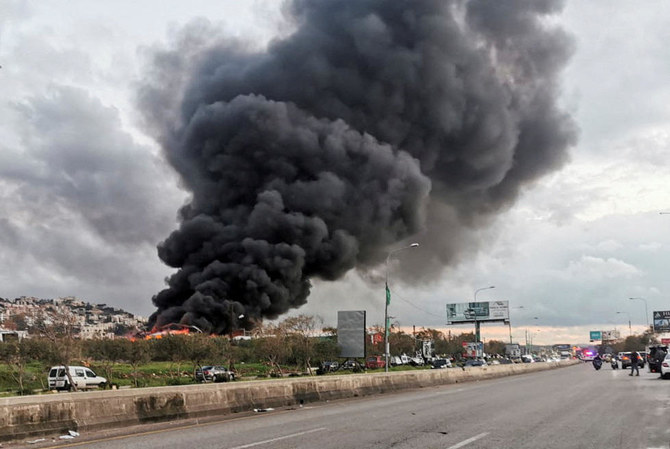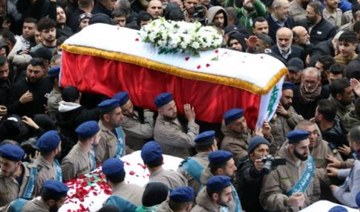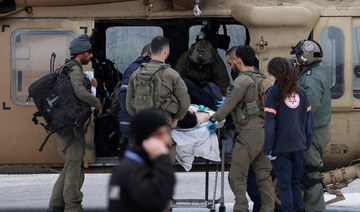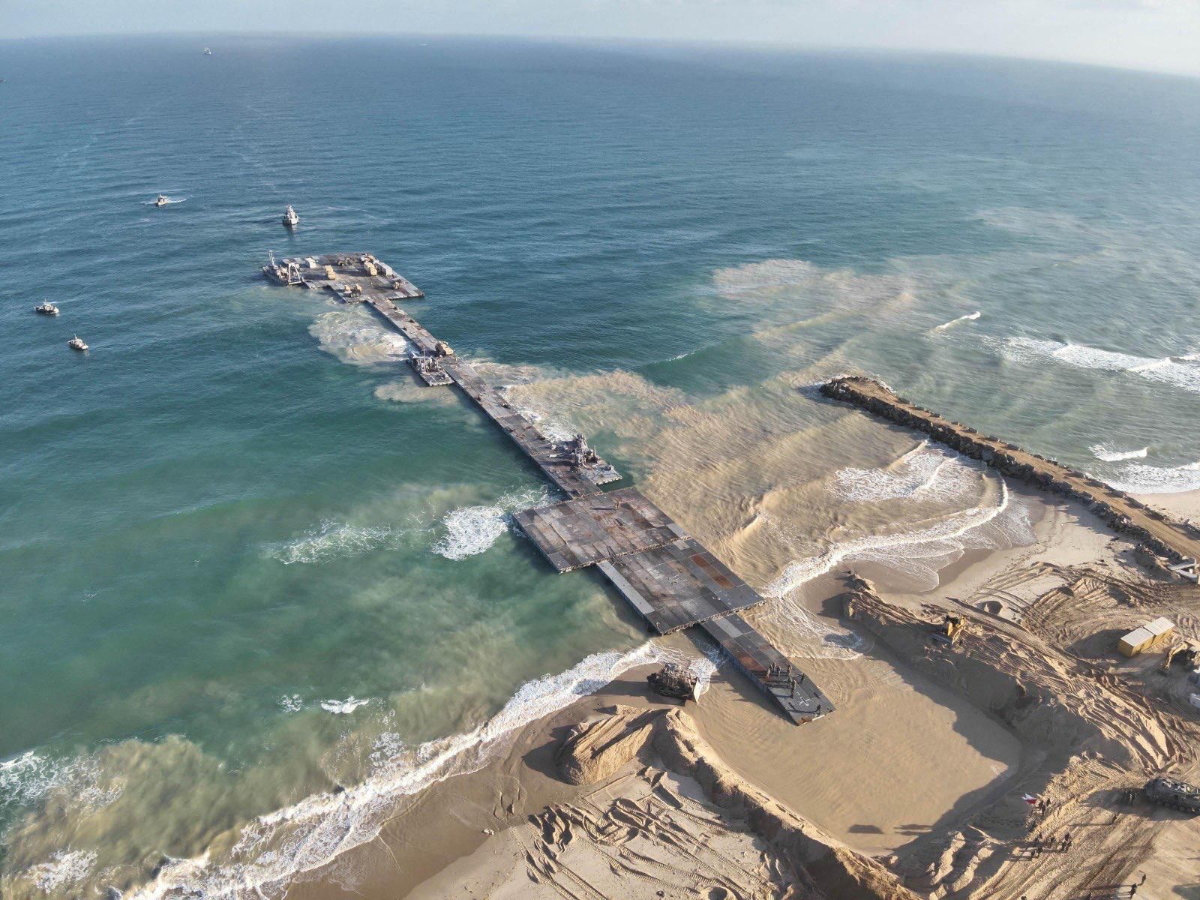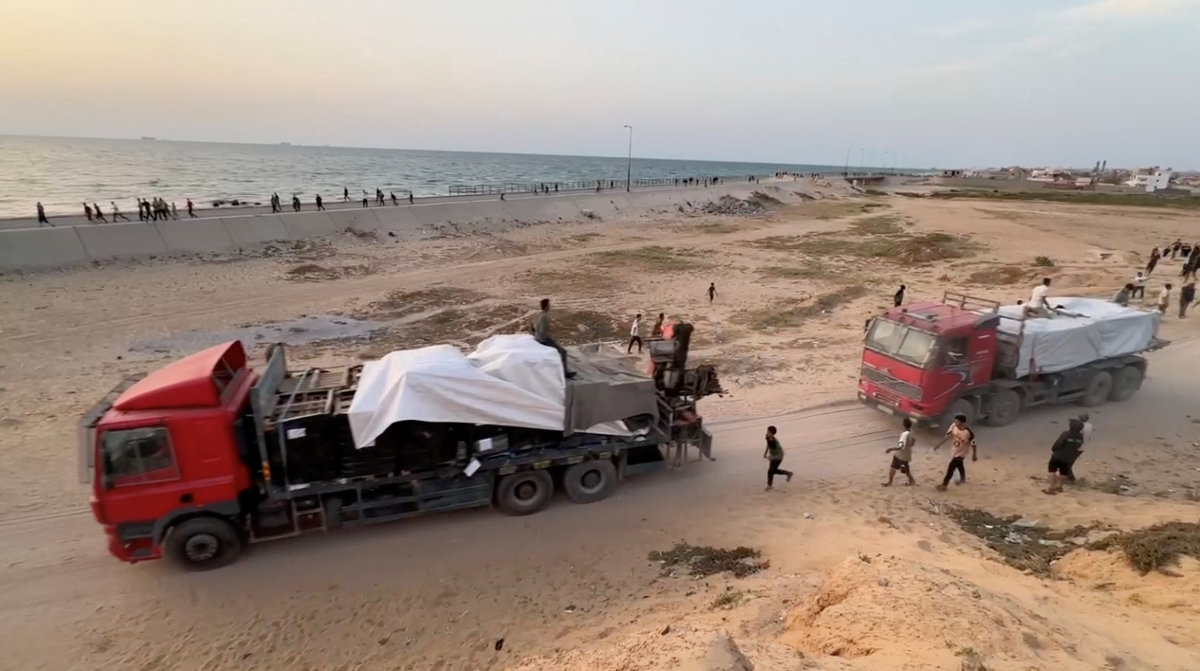BEIRUT: At least two Israeli air strikes hit southern Lebanon on Monday near the coastal city of Sidon, state media said.
Hamas ally Hezbollah and its arch-foe Israel have been exchanging near-daily fire across the border since the Israel-Hamas war broke out on October 7.
“Israeli warplanes carried out... strikes on the town of Ghaziyeh,” the state-run National News Agency (NNA) said Monday, adding that a vehicle was targeted and ambulances rushed to the scene, without providing further details.
Israeli army spokesman Avichai Adraee said: “The Israeli army targeted Hezbollah warehouses near Sidon. This bombing came in response to the explosion of an enemy drone, the wreckage of which was found near the Tiberias area this afternoon.”
Adraee added: “We will continue to work forcefully in response to Hezbollah's attacks.”
Israeli Army Radio also confirmed that “the army targeted Hezbollah infrastructure in the Ghaziyeh attack near Sidon.”
Hezbollah did not claim responsibility in this matter.
An AFP photographer reported the sound of at least two successive strikes in Ghaziyeh, with dark smoke billowing across the area.
The two raids were carried out by drones and targeted both sides of the Ghaziyeh highway, which connects Sidon to the south.
The first raid targeted a warehouse used to manufacture tires and generators, and the second targeted the vicinity of a factory that manufactured tiles, according to reports.
The explosions led to fires igniting at both sites and causing major destruction, while the injured were transferred to hospitals in Sidon.
The factories are owned by members of local families, named Khalifa and Laila. The owner of the tire factory said: “The raid hit the offices and generators, which were completely burned.” The owner confirmed that his factory did not store any weapons.
Opinion
This section contains relevant reference points, placed in (Opinion field)
A source told Arab News: “The two individuals are on the US sanctions list on charges of financing terrorism.”
While most the exchanges in recent months have been limited to areas near the frontier, Ghaziyeh is some 30 kilometers (around 20 miles) from the nearest Israeli frontier and less than five kilometers from Sidon.
Video circulating on social media showed large plumes of smoke arising from at least two strikes.
The Lebanese Ministry of Foreign Affairs, in an official statement, called on “countries wishing to restore stability and calm to southern Lebanon to condemn the ongoing and prolonged Israeli attacks on Lebanon, the latest of which occurred today in the Israeli attack in the town of Ghaziyeh.”
The ministry also called on the international community to “put pressure on Israel to stop its provocative attempts to expand the circle of war, and to lure Lebanon into a war that it is striving to prevent due to its threat to the security and stability of Lebanon and the entire region, and will only result in calamities and devastation.”
The Israeli military last week said it killed a Hezbollah commander, his deputy and another fighter in a strike in the south Lebanon city of Nabatiyeh.
The strike on a residential building also killed seven members of the same family, according to a security source, while another strike elsewhere killed a woman, her child and stepchild.
On Friday, Hezbollah chief Hassan Nasrallah vowed that Israel would pay “with blood” for civilians it killed in Lebanon in recent days, warning the group had missiles that could reach anywhere in Israel.
He warned that his Iran-backed movement has “precision-guided missiles that can reach... Eilat,” on Israel’s Red Sea coast, well beyond the northern towns it usually targets.
The latest uptick in violence has caused international alarm, with fears growing of another full-blown war between Israel and Hezbollah like that of 2006.
Since October, cross-border exchanges have killed at least 269 people on the Lebanese side, most of them Hezbollah fighters but also including 40 civilians, according to an AFP tally.
On the Israeli side, 10 soldiers and six civilians have been killed, according to the Israeli army.
* With AFP




